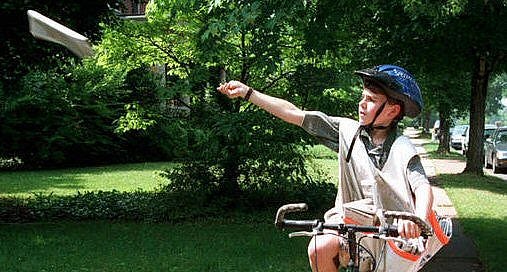A group of friends were sitting around the table enjoying adult libations and trying to solve all the problems of the world when we randomly landed on the topic of child labor, recently in the news. Then a long-time neighbor asked, “What’s the first real job you ever had?” We could all see each other’s faces light up at that moment.
“Now when I say first job,“ the good friend qualified, “doing chores for mom and dad doesn’t count.”
As we went around the table telling our stories full of nostalgia and pride, we laughed and we nodded “yes” to the importance of work lessons learned. We told stories about raking leaves, shoveling snow, de-tasseling corn, delivering newspapers, walking beans, mowing lawns, babysitting pets, pulling weeds, washing cars, collecting mail, watering plants, baling hay, feeding animals, tutoring kids, stocking shelves, taking inventory, lifeguarding pools, painting fences, distributing leaflets, making copies, caddying for golfers, and of course the classic, setting up a lemonade stand on the front lawn by the curb on the street.
We all agreed that first job was both scary and exhilarating as we took that first step into the real working-world, and gained an important learning experience we were proud of. We got a taste of independence and getting paid for our work and saving and spending that money however we chose.
Working 101.
My real-world job story was a paper route when I was 13 (following in the footsteps of my older brother) delivering papers for the Morning News. I got up at 3 AM to ride my bike to the shopping center to pick up my paper bundles, hauled them back to my garage, wrapped each paper with a rubber band, packed them into carrying bags on my bike, cycled through my route throwing papers from my bike onto the porch of each house, and delivered all my papers by the required 6 AM. I cycled home, slept for an hour until my parents woke me up to get dressed, have breakfast, and cycle to school. If my brother could do it, I could do it too!
That was just how it was back in the day. We were “extreme free-range kids” (no cell phones) and our parents didn’t know where the heck we were half the time. If they knew the risks we kids were taking they would have been shocked and grounded us asap. I saved my money and bought a used red Honda 150 motorcycle so I could: (a) expand my paper route; and (b) ride to the golf course on my own without asking my parents for a ride. I was free as a bird!
Those early work experiences can be a shock to the teenager accustomed to the comfortable order and structure and support of the elementary classroom. The real world is competitive, demanding, political, chaotic, and sometimes unjust, but there comes a time when kids have to get in the game. This is when kids find out that there are great bosses and lousy bosses, and the best way to deal with that is to follow through on tasks, avoid the bad people when you can, link up with the good people, become part of a team, keep your nose to the grindstone, do good work, and survive.
All easy for me to say. I was born into a middle-class world where I did not have to worry about food on the table or a roof over my head or violence in the streets, so delivering newspapers at 3 AM was doable. But there are millions of poor families who are not as lucky. Many kids have to start working as soon as they are able (whether it is “legal” or not) to help pay the family bills for rent and food. I didn’t understand any of this when I was kid. I just thought we were an average family living an average life (inside a white-privileged neighborhood bubble, of course). But whether rich or poor…..
….. all kids want to work!
So we should want them to all have a great first experience that they too can look back on. We adults need to make sure their working environment is legal, safe, and fair, and there is time left in the day to be at home playing with friends, doing homework, laughing at the dinner table with family, and getting a good night’s sleep in a secure environment.
Just seems like this country should be able to pull together to try and give every kid that chance.




